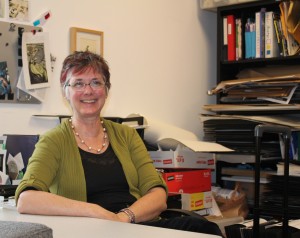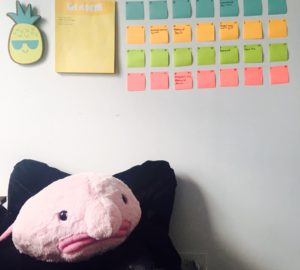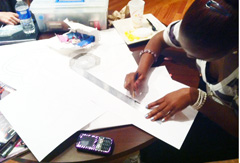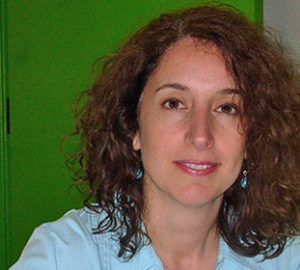
Foundation studies Professor Jo Peterson, dubbed “Mother SCAD” by many first-year students, sat down to explain the intricacies of the grading process for students looking to push their grade to the next level. With over thirty years teaching experience, Professor Peterson demonstrates the quality of SCAD Atlanta foundation studies faculty by emphasizing the importance of the student-teacher relationship.
“It’s not weighted for [students] to fail. It’s weighted for them to succeed, and if they don’t improve from project to project then they have to go to a help session, meet with a tutor, or talk to the professor and find out what it is they’re doing wrong,” Peterson said, about grading prospects.
Professor Peterson received an M.V.A. in printmaking from Georgia State University in 1976 and an M.F.A. in drawing from the University of Florida in 1995. She has been teaching at SCAD Atlanta since 2006 and recently presented a solo exhibition, “Light Dark Near Far,” at the Sandler Hudson Gallery, as well as “Mission Accomplished,” a Hand to Hand exhibit on the war in Iraq at ATHICA: Athens Institute for Contemporary Arts.
“What separates [an A from a B] to me is the degree to which the student has progressed with their idea, how much of it is individual, not pushed by me, and how much do they care about their presentation,” Peterson said, regarding the grading rubric in foundation classes. “The idea is that you don’t want for everyone to do the same project.”
Peterson admitted that in the beginning, the technical doesn’t count as much as the conceptual. “You should look for ways to express an idea that are out of the ordinary, more personal. It’s the extra, extra step. You take it beyond your first idea, beyond your second idea, and you come to a conclusion that’s unusual; that would be an A.”
The conceptual side of any project must be represented with the utmost extent of individuality and personal creativity, but any great concept must be backed by attention to technical detail and overall craftsmanship.
“It’s all part of the learning experience, and I always point out – look at the things you did well, and then go to the things that you need to work on,” Peterson said. “I’m an eternal optimist. I look at it as these are things [you] need to work on, but the key is [you’re] going to work on them.”
Peterson went on to say that students should seek the “extra step,” and never discount a work as just another project. The system is designed for students to improve, she says, whether technically or conceptually. Students are encouraged to make a mind-map, organize their thoughts and strive to conceptualize something distinctive.
An A grade is more likely, Peterson says, if a student’s work stands apart from others. Any project, paper, design or draft is an opportunity for students to show the professor their creative and professional talent. With this mindset, innovation becomes a function of the process, as opposed to the product.























